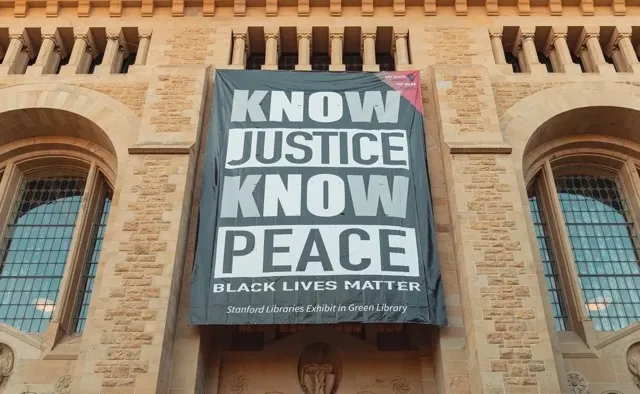Table of Contents
I distinctly remember the look of disdain I received from a relative when I told her I was going to Stanford. In her eyes, I had accepted a one-way ticket to a fraught and destructive institution. At the time, I did not truly understand her concern—I do now.
Over the past few years, Stanford has become inextricably intertwined with censorship, collaborating with the government and Big Tech to censor American citizens and wrongfully condemning its own faculty members. The University racially engineers its classes, and its bloated bureaucracy now boasts 80 DEI bureaucrats who egregiously undermine academic discourse and condone the shouting down of a federal judge.
Since I arrived here, Stanford seems to have produced more stories of fraud than groundbreaking startups. The classroom has become void of rigorous academic debate because of a culture that believes some ideas are too dangerous and an administration that refuses to stand rigorously on the principles of academic freedom.
After Hamas slaughtered 1,200 Israelis on October 7th, students camped out in support of Palestine for 120 days and pushed false narratives for their agenda. The University took two days to issue a statement after the massacre, declaring that it “is grounded in a principled belief that the appropriate role of university administrators in relation to geopolitical events is not to take positions or issue statements, but to create an environment in which faculty and students are free to develop and exchange ideas free from institutional orthodoxy.”
However, this same university that considered the situation merely a “geopolitical event” calls for an explicit uprising on campus for racial justice. Their Black Lives Matter “KNOW JUSTICE KNOW PEACE” banner is boldly unfurled on Green Library’s entrance in words so large it can be read from Main Quad to E-Quad. Meanwhile, the Stanford Faculty Senate condemned Dr. Scott Atlas for saying during Covid lockdowns that “The only way this stops is if people rise up.”
Our country now fears universities like our own. What once used to be the defining traits of the American spirit have been denounced by our very own university. Our leading institutions are now the polluting firms, and it is our country that lies downstream. What once used to produce the solutions to our problems is now producing the problems itself. To the outside world, Stanford is seen as a university that stands contrary to American values.
As a consequence, the Review is more essential now than ever. For thirty-seven years, The Stanford Review has risen up against the status quo and ideological conformity in our trademark contrarian spirit.
My fellow students and I now look back on past generations of leaders who refused, out of fear, to stand up for their principles when it was most needed. They are the reason we are here today. They lacked the courage, integrity, and exceptional leadership that built and preserved our country. Today, too many “courageous” leaders take a final stand on superficial issues and neglect the ubiquitous decline of our country.
So, how do we move on from here?
Dr. Atlas is right: “If our democracy, with its defining freedoms, is to survive, we need good people, individuals with integrity, and there are many, to rise up—meaning speak up, as we are allowed, as we are expected to do in free societies—or it has no chance.”
The Review has remained a haven of contrarianism at Stanford, and we will continue to be just that, holding our institution accountable and refusing to stand idly by when principles slip away. I am certain that the Review will continue to thrive and produce the next generation of leaders who will rise up.
I am beyond grateful to be working with a truly excellent staff: Julia Steinberg, Tom Adamo, John Puri, Aditya Prathap, Abhi Desai, an exceptional freshman class, and the many more contributors who will surely make this a great volume.
I am also very thankful for the Review editors who came before me. To Neelay Trivedi, for publishing my first article; Mimi St Johns, the best contrarian I know; and Walker Stewart, for invaluable guidance, leadership, and mentorship in Volume LXVII. I am honored to serve as Editor-in-Chief for Volume LXVIII, and, most especially, the opportunity to work in the company of an incredible staff—and great friends.
Most of all, I am thankful for the mentorship of some of the most courageous leaders right here at Stanford, including Dr. Scott Atlas and my advisor, Dr. Jay Bhattacharya. They are the true models of courage and leadership that our country needs right now. They stood up for their values and principles when it was most needed, even though they were condemned for doing so. It is this leadership that I look up to, and they are the reason I can write this article today. If our country is to persevere, we must follow in their footsteps.
In just the past year, the Review's staff has testified twice before Congress, appeared on numerous major media outlets, and covered stories that effected change and received national attention. Amid the 2024 election and global conflicts that bleed onto our campus, the Review will continue to hold accountable the administrators, bureaucrats, and students who fail to uphold the essential principles of academic freedom.
However, it is only because of the gracious support of our donors and the mentorship from professors, academics, and business leaders that the Review can flourish. I give my deepest gratitude to all of you who have helped the Review thrive over the past years.
As the country looks with disdain upon our institutions—the same way my family member looked upon my Stanford acceptance—please know that hope is not lost. “The only way this stops is if people rise up,” and for thirty-seven years, The Stanford Review has and will continue to stand as the beacon of contrarianism at our institutions that choose to stand contrary to America.
Fiat Lux,
Josiah Joner
Editor-in-Chief, Volume LXVIII
If you want to support the Review, you can subscribe to our free mailing list or make a donation.






